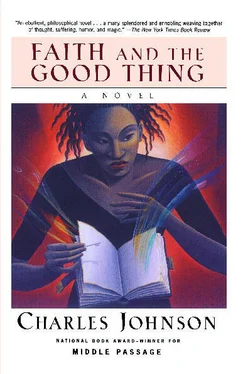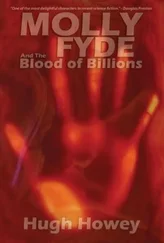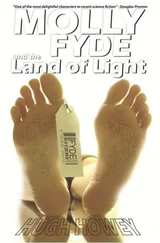“Then what is it?” she said dreamily as they strolled downtown. But she knew the answer, could see it: a comfortable home, clothes, a car, and a big-hearted husband to do her bidding.
“Ha!” Barrett laughed. He spread his arms. “This is precisely what you and I will discover, Faith. It’s the human adventure, this quest for the Good Thing. But you must believe; it’ll never appear otherwise.” Barrett broke off, noticing, not two blocks away, a park bench beside Soldier’s Field. He led Faith to it, coughing horribly, sat her at one end, and stretched out, his hands behind his head.
“As co-workers,” he said, “we’re questers for that which in all ages was the one thing denied man: absolute certainty.” He leaned back his head, looking upside down at her, smiling, then taking in the dark stretch of blue sky above. “That makes us fools. My wife, Amelia, always called me that, because this thing possessed me so, but I’d always come back with, ‘Yes, dear heart, but a Great Fool.’ ” Barrett sighed deeply, scratching his neck. “There’s a big difference. Amelia never understood that. She was a beautiful woman, such haecceitas you’ve never seen, but she was never tortured by beauty — she never looked at a rose and, by dint of reason, went beyond it to yearn for roseness. You see, the entire world was allegory for me — ah, I was a strange child! It always pointed beyond, or perhaps below, itself to something more good, more real and glorious than what I could see. Uncovering this meaning— that to me was philosophy. Not only philosophy, Faith, but life’s work itself — exegesis of the rose, of the world.” Barrett coughed; he nearly strangled, then looked at the thin light of dawn, smiling mysteriously. “My son is an electrical engineer in Vermont. Bright boy, Jimmy. My daughter, Lillian, is a fashion model in New York City. Can you imagine a father’s woe at having children who rebelled against my vision, who thought I was senile and, in cahoots with Amelia, tried to have me committed to a home? Faugh! I ran away. That was eight years ago, on my sixtieth birthday, and I’ve been growing younger ever since. ”
Faith, alert now and rapt, rested on the hard bench beside Barrett, surfeited with the stillness of a morning so blue that sky and water on the lake were merged without the slightest suture. The skyscrapers were the color of deep-sea pearls, as were the clouds, an armada passing overhead. She longed to look upon them forever, to fix them in her mind, to hold on to some thing, because she lacked so much. Lacked the rose, let alone roseness. She looked at Barrett as he clutched his Doomsday Book to his chest, and saw him as a projection of what she would be if she continued to search: moral wreckage. But he was sweet. To search with him — would it be so bad?
“Co-workers,” she whispered to herself. Faith laid her hand on Barrett’s head, felt movement on his scaly scalp, and lifted — with her fingertips — a flea from his hair. He was unkempt, oblivious to the external world that seemed to wreak such woe on her and Tippis. He was unsightly, had breath like that of a dying dragon, and probably needed to be in a cancer ward. Yet what he said deeply impressed her.
“Will you look with me?” she asked. She heard Barrett’s stomach rumble. It sounded like a sewer.
He coughed in a terrible way and said, “Und zwar von Herzen. ”
“Does that mean yes?”
Barrett seemed sleepy; he closed his eyes and smiled from ear to ear. Faith understood — Jimmy and Lillian Barrett had hurt him sorely; she would replace them. Faith removed her coat and spread it across his shoulders. Then she slipped the book from beneath his hands and opened it with the key. She was not surprised. In the thin, irenic rays of morning, as she listened to Barrett’s throat rattling under the chirping of pigeons in the trees above, Faith saw that each of the hundred pages of the black-bound, dog-eared Doomsday Book was, from top to bottom, blank, as empty as she imagined the world to be, and by virtue of this a sort of screen onto which her thoughts spread out like an oil slick on the surface of the sea. She smiled to herself and stared at the pages as though they actually held words, images. They did, but only as long as she conjured them there. On the first page she saw her father crossing the dung-brown fields behind his farmhouse, fields splattered with rivulets and pools by late summer rain — weather vanes, silos, hound dogs lying on their sides in the shade of a tree, tiny hay bins and barns filled with ensilage were in the distance against a sky that looked like water — broad, blue, its clouds rolling like great, feathery waves. Then, because she willed it, she saw Lavidia splitting thick logs from the woodpile by the toolshed, singing some old, warm hymn and making up new verses while blackbirds flew as tiny specks in formation above her head with a sound like clothes flapping on a line, then came to rest on the ground nearby, searching the woodpile and yard for scraps of bread and meat. She saw Alpha Omega Jones waving to her from a wind-ruffled cane field, walking in a drying wind through its golden, swaying stalks to sweet-gum trees where she, still a child dressed in blue, waited. As long as she looked and flipped the stiff pages of the book, she could see the farmhouse with clouds of gray smoke curling from its chimney in the dead of wintertime, then the lilting sewing bees and barnyard suppers in the spring, goats nibbling turnips, the picnics in Indian summer by the quiet ponds near the woods — the particular magic and music of a world to which she might never return, but loved all the more because it was unattainable.
Faith closed the book. She touched Barrett’s arm, for he had given her this. And this: a thought she almost believed — that beauty, truth, and goodness could be born in shipwrecked lives, that flowers might yet bloom on a dead man’s grave. Once livid, his arm was cool. Cooler than the blue morning itself. She knew this sleep well, had seen it take Big Todd, then Lavidia from her as it had now taken Barrett, releasing him as if the green hand of death were stayed only until that moment when a life devastated by suffering had produced its Doomsday Book and given it to another, until it had scaled Mount Kilimanjaro or fallen exhausted, clutching the elusive Good Thing.
Faith quickly lifted her coat from him and walked to a telephone booth at the corner. She counted the money Barrett had given her. Two hundred dollars. Then she searched her pockets for a dime, and called the police.
Trying to control her voice was hard, but she managed when someone on the other end answered in a gruff voice, “Yes?”
“I’m at Soldier’s Field,” she said. “A man just died on the park bench—”
“Dead!” the voice roared.
“Yes,” Faith said, her hand moving to replace the phone on its hook. “But he’s not such a fool as he seems. ”
The grave released Richard Barrett.
Children, the crypt couldn’t contain his spirit any more than death could end his concern for Sweet Faith Cross. Dutifully, he returned as a wraith, companion, and troubled conscience that would not let her rest. Without fail each Friday and always at midnight he came to her hotel, the stench of Hell’s outer circle heavy in his train. Such resurrections happen nearly every day. Esau Holmes, covered with mold and maggots, scrambled out of the cemetery back in ’26 to attend his daughter’s wedding, and everybody’s heard of how old Annie Bell Finch reared up in her casket when her husband Fred arrived at her wake with that fast young gal from Georgia. Listen, if you die before achieving some long-cherished goal, or before seeing some sight long nurtured in your dreams; if you die before seeing the sun rise red as Satan’s eye over the sea, or before hearing the cry of swallows break the stillness of dawn, or before feeling dew from some enameled expanse of country between your toes, then nature in you, too, will not be stilled at death.
Читать дальше












